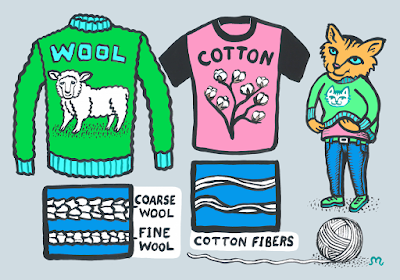Why Are Most Sweaters Made of Wool (And Not Cotton)?
Summer in St. Louis, Missouri has
steadily come to an end. Over the course of this month, the average temperature
of the city plummeted from 84 degrees Fahrenheit to 78 degrees Fahrenheit, and
current models predict that it may drop even further. Netizens and St. Louis
natives alike are predicting that this fall and winter are going to be harsher
than last year and are bracing for the cold. In that spirit, I made a trek to
the local Target to purchase some winterwear, just to find that most of the
sweaters found there were made out of wool. But that begs the question: why? What
makes wool superior to other materials like cotton?
Both wool and cotton are natural
fibers, each having excellent properties such as being durable, lightweight,
and elastic. However, the crucial difference lies in the surface of the spun yarn
of these materials. The surface of woolen yarn is made up of overlapping
cuticles, creating fibers are “scaly” and rough (hence the scratchy feeling
when you touch wool). This structure forms tiny air pockets that trap heat and
act as a natural insulator, excellent for cold weather.
In comparison, cotton yarn has a
much smoother surface, which makes it soft on skin, but also makes it lack heat
retention abilities. This quality is actually the reason you see most summer clothes
being made of cotton.
St. Louis may be staring down the
barrel of a series of polar vortexes, but with my woolen armor at my side, I
know I’ll be ready.
References



Comments
Post a Comment